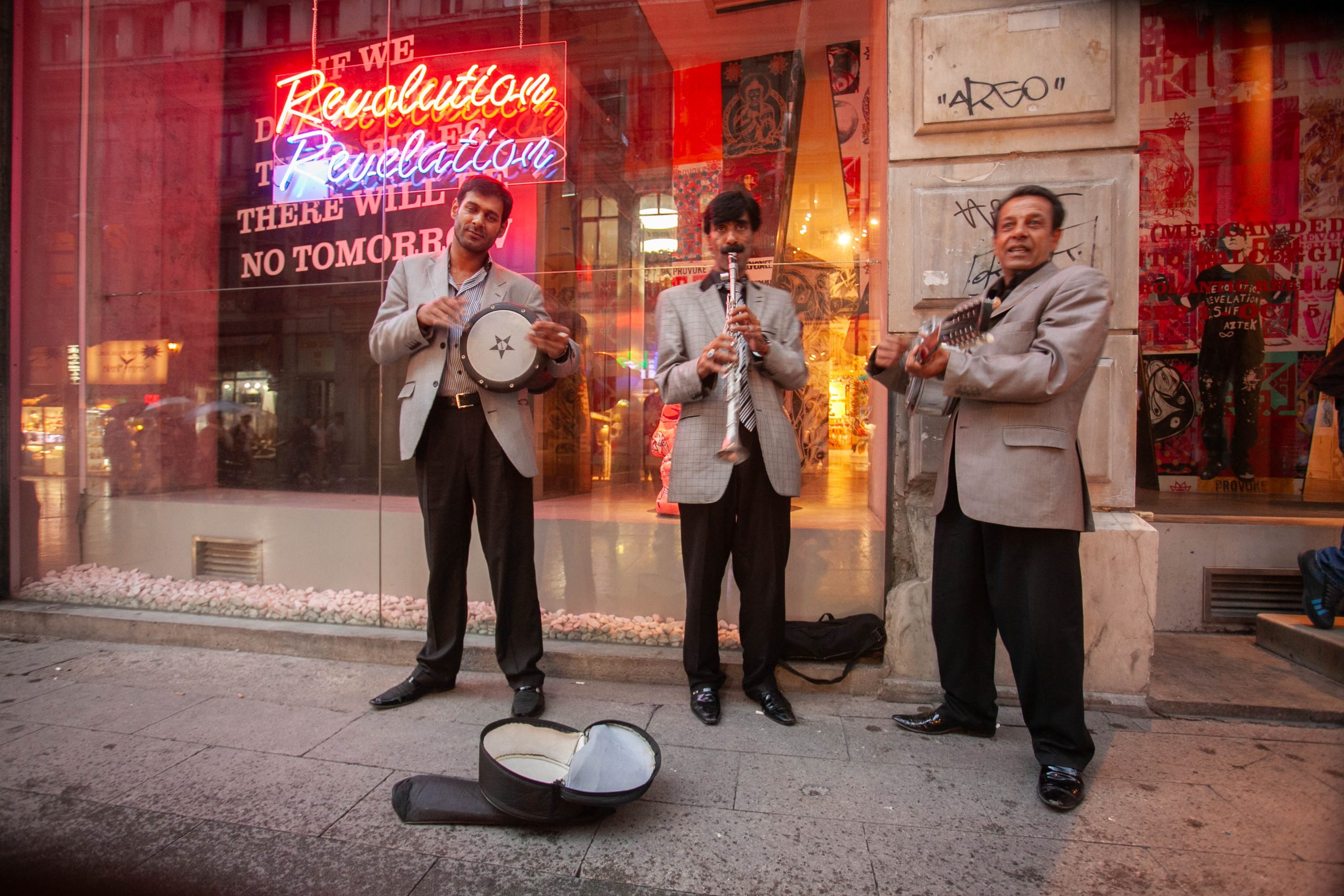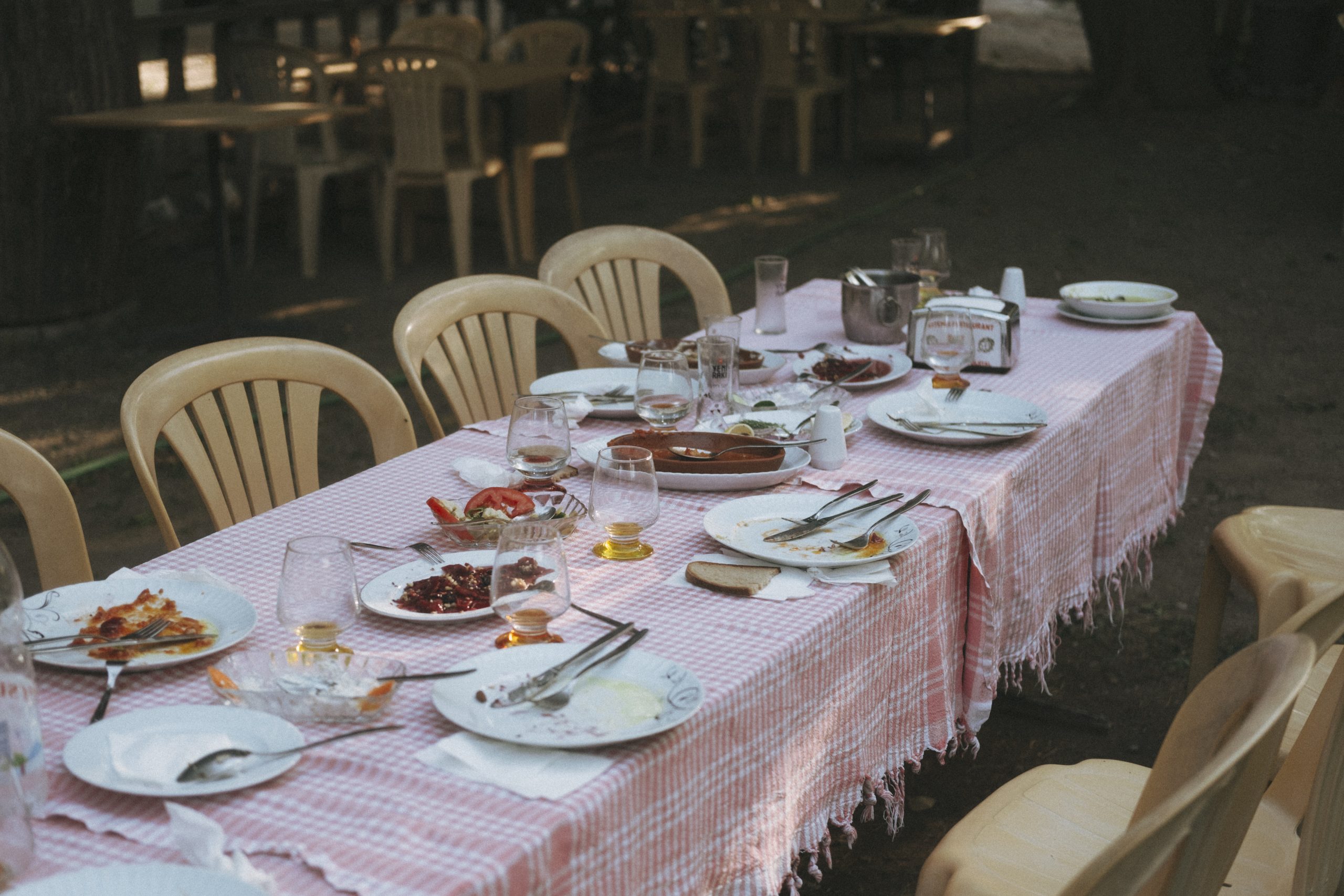What to Expect Musically
Meyhane music falls into two main categories: arabesque/folk/pop music (we will get into subcategories later) and fasıl music. In case you’re not familiar with it- arabesque music blends Turkish folk with Arabic musical traditions, characterized by its emotional, often melancholic style. It became popular in the 1960s and 1970s, reflecting themes of longing and hardship, resonating deeply with many listeners. Pop/folk music* is not a good description of what type of music you’ll hear; if you’re not familiar with folk and pop music in Turkey, then you’ve got nothing to compare it to other than what you know, and what you know is very likely nothing like it. So we’ll break it down a bit.
*Think old music, depending on how old you are. But definitely not this new pop stuff.
Fasıl Music: The Heart of Meyhane Sound
Fasıl music is a continuous, jam-session style performance of traditional Turkish classical music. Instruments like the saz (long-necked lute), oud (short-necked lute), kanun (zither-like instrument), ney (reed flute), yaylı tambur (bowed string instrument), and darbuka (goblet drum) take center stage. These sessions can last for hours, creating an engaging musical experience.
Sometimes you’ll hear live music performed by hired musicians at a restaurant, often playing fasıl music but sometimes including arabesque/folk/pop songs. There’s also sokak müziği, or street music, where musicians, typically with clarinet, violin, and darbuka, walk from meyhane to meyhane, playing loudly in patrons’ ears. Be patient with them, tip well, but don’t tip at the very beginning, or they might not leave your table. If you seem very interested, they might stay longer, so embrace it and enjoy the impromptu concert.
The Unique Voices of Turkish Music
Turkish music is known for its distinctive vocal techniques, particularly the use of mordents and trills. A mordent is a musical ornament that involves a rapid alternation between a note and the note immediately above it. It adds a decorative, wavering sound to the melody. Similarly, a trill involves a rapid alternation between two adjacent notes, creating a continuous, vibrating effect. These techniques give Turkish music its rich, emotional texture, making each performance deeply expressive and unique. It’s an acquired taste, much like rakı, the anise-flavored spirit often enjoyed in meyhanes. For newcomers, it might sound a bit unusual at first, but it’s a defining characteristic of the genre.
Themes and Popular Songs
Songs in Turkish classical music (Türk Sanat Müziği) and fasıl music often delve into love, longing, and heartache. It’s no joke. Here are some examples:
Elbet bir gün buluşacağız,
Bu böyle yarım kalmayacak
Surely one day we will meet,
this will not remain incomplete
Geceler yarim oldu,
Yine dertlere saldı
Nights have become my companion,
again plunging me into sorrows
Ben seni unutmak için sevmedim,
Bir anlık sevinç için sevmedim
I didn’t love you to forget you,
I didn’t love you for a moment’s joy
Some Icons of Meyhane Music
Zeki Müren
Often referred to as the “Sun of Art” in Turkey, Zeki Müren’s dramatic and profoundly emotive voice is a staple in meyhane playlists. Did you know he was also a poet and an actor? His flamboyant stage persona and elaborate costumes made him a cultural icon beyond his musical talents.
Bülent Ersoy
With a career that spans decades, Ersoy’s songs delve deep into the heart’s complexities. Besides her powerful voice, Ersoy is known for her bold personality and has been a prominent figure in Turkish media. She is also one of the first openly transgender singers in Turkey, breaking barriers and challenging norms.
Müzeyyen Senar
Renowned for her command over fasıl music, Senar brings a classical touch to the modern meyhane. Beyond her music, she was known for her resilience; she continued to perform well into her 90s, proving that age is just a number.
İbrahim Tatlıses
Known more for Arabesk, Tatlıses’ ventures into Türk Sanat Müziği are equally compelling. His life story is one for the books: from humble beginnings selling tickets in a movie theater to becoming one of Turkey’s most beloved singers. Tatlıses has survived numerous personal challenges, including an assassination attempt, making his music even more poignant.
The True Role of Music in Meyhanes
As the night progresses and the rakı flows more freely, expect spontaneous sing-alongs. This is when the music truly comes to life, transforming from a background soundtrack to the main event. You won’t know the words (except if you’re that one foreign fasil nerd out there who’s never been to a meyhane, and if that’s the case, call us and let’s go to one together) and that’s fine. You’ll probably be tempted to take pictures or a video, but it’s recommended to just sit back and soak it all up.
My Personal Take on Meyhane Music
I was first introduced to the meyhane a couple of months after arriving in Turkey, but I didn’t truly experience it in the real sense until two years into my stay. At my first genuine meyhane outing, surrounded by a table of locals with a deep appreciation for everything meyhane, I encountered Türk Sanat Müziği in its natural habitat. As a Westerner with a classical music background, I initially struggled with the trills, the mournful tones, and the pervasive minor chords—everything seemed to blend into a continuous lament. However, immersed in the authenticity of that setting, I began to perceive the music differently.
It’s challenging to articulate how seamlessly the music complements the food, the drink, and the ambiance. Perhaps it’s somewhat akin to the live sessions in a real Irish pub in the countryside, but the experience in a meyhane is profoundly richer. You’re not just out at a bar or dinner; you’re part of an intential communal fabric where conversation syncs with the music. Even if the melodies lean towards the dark—a touch of arabesque in mood, embodying a blend of deep emotion and subtle optimism—there’s an undercurrent of joy derived from the shared experience. And rakı is a unique medium that binds people together, offering both security and comfort.
Turkey is a land of contradictions (this is a common theme you may see a lot around here), and nowhere is this more apparent than at a meyhane sofrası. It’s a place where vulnerability meets the warmth of companionship. Perhaps that’s why these nights resonate so deeply; in our guarded daily lives, finding a space to lower our defenses isn’t easy. The meyhane offers this sanctuary, with the music acting as a comforting backdrop to our shared human experience.
Need some music to get you in the meyhane mood? We’re working on the ultimate meyhane playlist. Sign up for our newsletter so you’ll know when it’s released.
 photograph by Tan Kurttekin
photograph by Tan Kurttekin
